Heat Energy: The Nation’s Forgotten Crisis
On 5 June 2015, The Institution of Mechanical Engineers published Heat Energy: the Nation’s Forgotten Crisis in the context of its vision of ‘Improving the world through engineering'.
The report suggests that the UK’s existing heat infrastructure evolved during a time of abundant supplies of affordable North Sea gas, but that it is not suitable to meet the country’s future energy security challenges, social needs or decarbonisation aspirations.
It states that, ‘The provision of heat in the UK for domestic, commercial and industrial applications is largely based on the consumption of gas and delivered through an infrastructure developed at the end of the last century. This infrastructure was designed and engineered to exploit abundant gas reserves located under the North Sea. However, these are depleting rapidly and, as the nation’s gas imports rise through our undersea pipeline connections and via our LNG receiving terminals to maintain supply, the time to focus attention on how best to transition to new energy sources for heat is long overdue.’
It proposes that this is an order of magnitude more complex that decarbonising energy and will require renewal of the nation’s heat infrastructure.
The report recommendations that the government:
- Declare all UK building stock ‘national infrastructure’ and instigate a legislatively-driven insulation programme with incentives, such as a reduction in stamp duty, for homeowners to install insulation to national standards. For those who cannot afford to pay, a national scheme to cover the cost of work would be funded by general taxation.
- Recognise the key role of the installer community and instigate a mandatory national installer ‘sustainable heat’ certification scheme similar to CORGI certification / Gas Safe Register for gas installers.
- Tackle the provision of larger pieces of national heat infrastructure, as well as the interconnection and integration of heat systems with other energy networks.
Dr Tim Fox, lead author of the report said: “The UK’s housing stock is some of the most poorly insulated in the developed world, largely because of the age of much of the country's domestic dwellings and the failure of successive Governments to take the meaningful action required on energy efficiency measures. Poorly insulated homes cost the NHS an estimated £1.36 billion every year, with one estimate placing 6.5 million UK homes in fuel poverty. In addition, the amount of money and fuel that is wasted on heating poorly insulated homes is appalling, and the UK is facing a future of depleting UK gas reserves. It is clear that it is time for urgent action to improve energy efficiency in UK homes.
[edit] Find out more
[edit] Related articles on Designing Buildings Wiki
- A measure of net well-being that incorporates the effect of housing environmental impacts.
- Adapting 1965-1980 semi-detached dwellings in the UK to reduce summer overheating and the effect of the 2010 Building Regulations.
- Anatomy of low carbon retrofits: evidence from owner-occupied superhomes.
- Energy companies obligation ECO.
- Fuel poverty.
- Green deal scrapped.
- Housing contribution to regeneration.
- The cold man of europe 2015.
- The real cost of poor housing.
- Transitioning to eco-cities: Reducing carbon emissions while improving urban welfare.
- Well-being and regeneration: Reflections from Carpenters Estate.
- Wellbeing.
Featured articles and news
UKCW London to tackle sector’s most pressing issues
AI and skills development, ecology and the environment, policy and planning and more.
Managing building safety risks
Across an existing residential portfolio; a client's perspective.
ECA support for Gate Safe’s Safe School Gates Campaign.
Core construction skills explained
Preparing for a career in construction.
Retrofitting for resilience with the Leicester Resilience Hub
Community-serving facilities, enhanced as support and essential services for climate-related disruptions.
Some of the articles relating to water, here to browse. Any missing?
Recognisable Gothic characters, designed to dramatically spout water away from buildings.
A case study and a warning to would-be developers
Creating four dwellings... after half a century of doing this job, why, oh why, is it so difficult?
Reform of the fire engineering profession
Fire Engineers Advisory Panel: Authoritative Statement, reactions and next steps.
Restoration and renewal of the Palace of Westminster
A complex project of cultural significance from full decant to EMI, opportunities and a potential a way forward.
Apprenticeships and the responsibility we share
Perspectives from the CIOB President as National Apprentice Week comes to a close.
The first line of defence against rain, wind and snow.
Building Safety recap January, 2026
What we missed at the end of last year, and at the start of this...
National Apprenticeship Week 2026, 9-15 Feb
Shining a light on the positive impacts for businesses, their apprentices and the wider economy alike.
Applications and benefits of acoustic flooring
From commercial to retail.
From solid to sprung and ribbed to raised.
Strengthening industry collaboration in Hong Kong
Hong Kong Institute of Construction and The Chartered Institute of Building sign Memorandum of Understanding.
A detailed description from the experts at Cornish Lime.
























